Sooyeon Jeong
A Robot That Listens: Enhancing Self-Disclosure and Engagement Through Sentiment-based Backchannels and Active Listening
Sep 09, 2025Abstract:As social robots get more deeply integrated intoour everyday lives, they will be expected to engage in meaningful conversations and exhibit socio-emotionally intelligent listening behaviors when interacting with people. Active listening and backchanneling could be one way to enhance robots' communicative capabilities and enhance their effectiveness in eliciting deeper self-disclosure, providing a sense of empathy,and forming positive rapport and relationships with people.Thus, we developed an LLM-powered social robot that can exhibit contextually appropriate sentiment-based backchannelingand active listening behaviors (active listening+backchanneling) and compared its efficacy in eliciting people's self-disclosurein comparison to robots that do not exhibit any of these listening behaviors (control) and a robot that only exhibitsbackchanneling behavior (backchanneling-only). Through ourexperimental study with sixty-five participants, we found theparticipants who conversed with the active listening robot per-ceived the interactions more positively, in which they exhibited the highest self-disclosures, and reported the strongest senseof being listened to. The results of our study suggest that the implementation of active listening behaviors in social robotshas the potential to improve human-robot communication andcould further contribute to the building of deeper human-robot relationships and rapport.
Past, Present, and Future: A Survey of The Evolution of Affective Robotics For Well-being
Jul 03, 2024Abstract:Recent research in affective robots has recognized their potential in supporting human well-being. Due to rapidly developing affective and artificial intelligence technologies, this field of research has undergone explosive expansion and advancement in recent years. In order to develop a deeper understanding of recent advancements, we present a systematic review of the past 10 years of research in affective robotics for wellbeing. In this review, we identify the domains of well-being that have been studied, the methods used to investigate affective robots for well-being, and how these have evolved over time. We also examine the evolution of the multifaceted research topic from three lenses: technical, design, and ethical. Finally, we discuss future opportunities for research based on the gaps we have identified in our review -- proposing pathways to take affective robotics from the past and present to the future. The results of our review are of interest to human-robot interaction and affective computing researchers, as well as clinicians and well-being professionals who may wish to examine and incorporate affective robotics in their practices.
A Robotic Positive Psychology Coach to Improve College Students' Wellbeing
Sep 08, 2020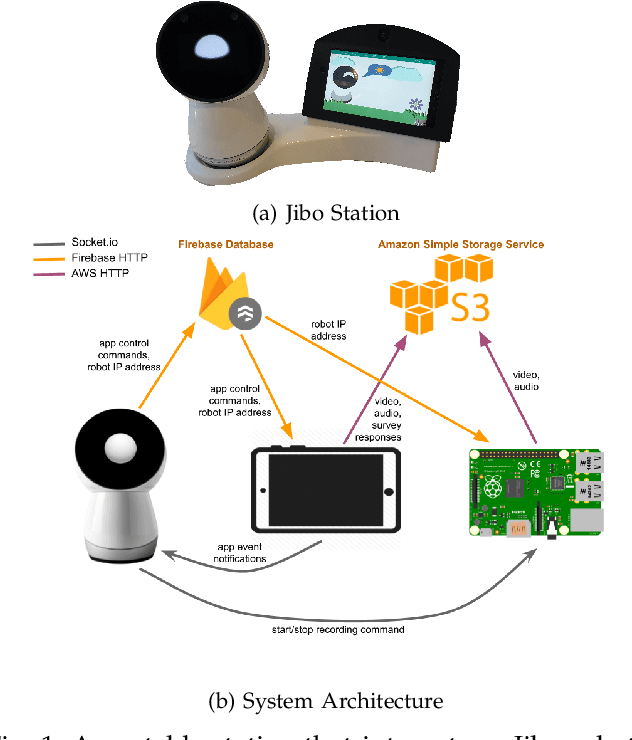
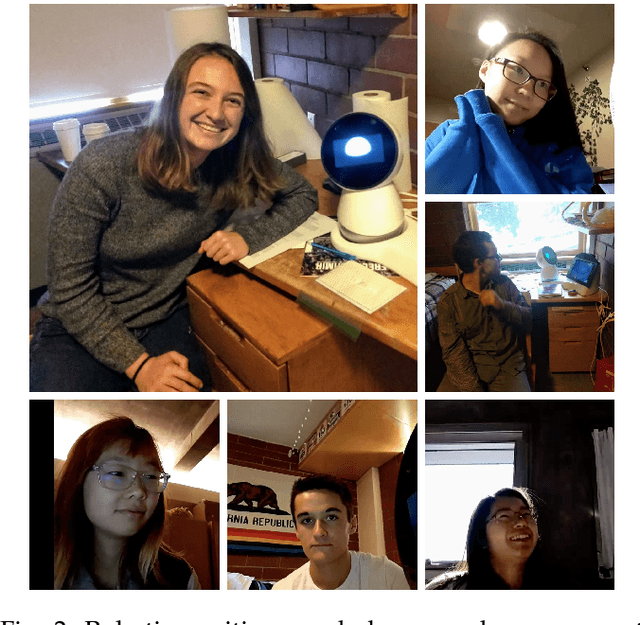

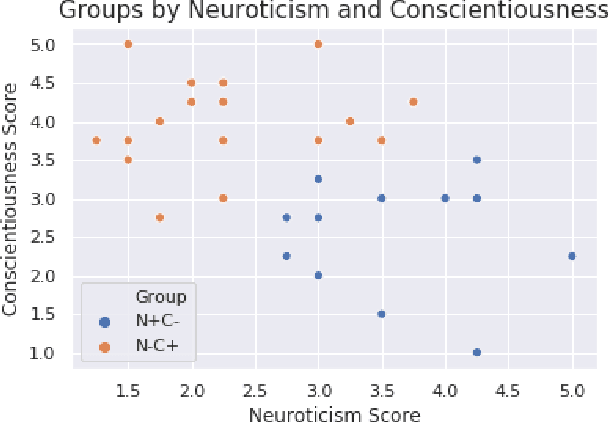
Abstract:A significant number of college students suffer from mental health issues that impact their physical, social, and occupational outcomes. Various scalable technologies have been proposed in order to mitigate the negative impact of mental health disorders. However, the evaluation for these technologies, if done at all, often reports mixed results on improving users' mental health. We need to better understand the factors that align a user's attributes and needs with technology-based interventions for positive outcomes. In psychotherapy theory, therapeutic alliance and rapport between a therapist and a client is regarded as the basis for therapeutic success. In prior works, social robots have shown the potential to build rapport and a working alliance with users in various settings. In this work, we explore the use of a social robot coach to deliver positive psychology interventions to college students living in on-campus dormitories. We recruited 35 college students to participate in our study and deployed a social robot coach in their room. The robot delivered daily positive psychology sessions among other useful skills like delivering the weather forecast, scheduling reminders, etc. We found a statistically significant improvement in participants' psychological wellbeing, mood, and readiness to change behavior for improved wellbeing after they completed the study. Furthermore, students' personality traits were found to have a significant association with intervention efficacy. Analysis of the post-study interview revealed students' appreciation of the robot's companionship and their concerns for privacy.
Migratable AI
Jul 11, 2020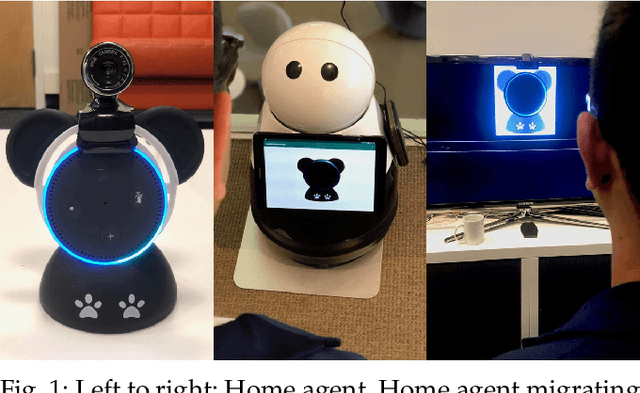

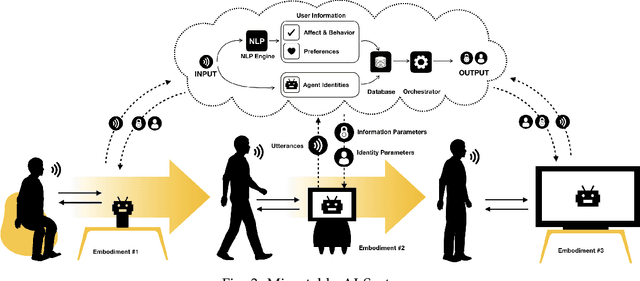
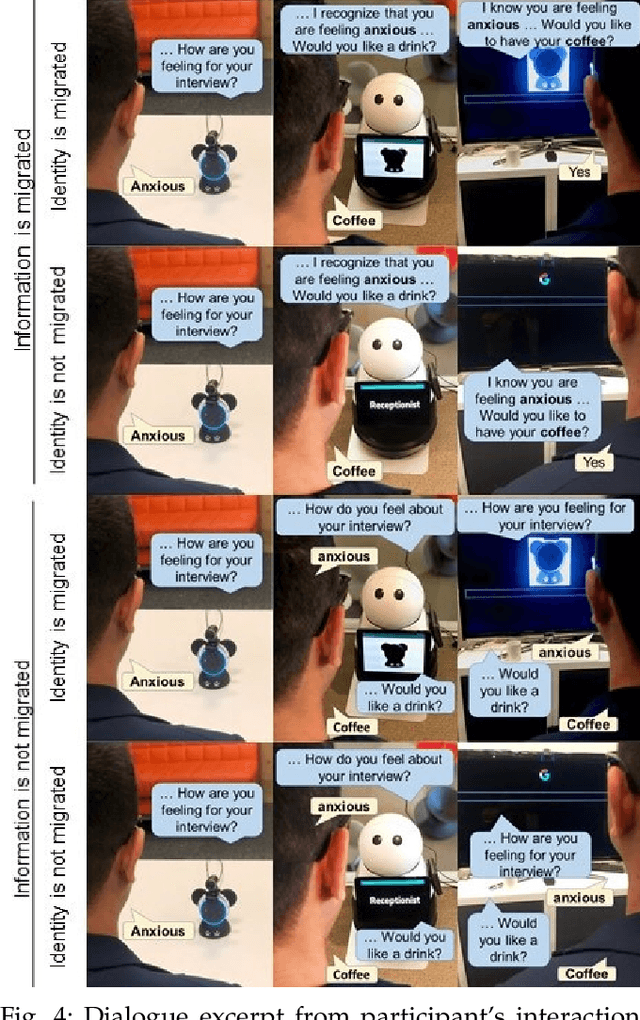
Abstract:Conversational AI agents are proliferating, embodying a range of devices such as smart speakers, smart displays, robots, cars, and more. We can envision a future where a personal conversational agent could migrate across different form factors and environments to always accompany and assist its user to support a far more continuous, personalized, and collaborative experience. This opens the question of what properties of a conversational AI agent migrates across forms, and how it would impact user perception. To explore this, we developed a Migratable AI system where a user's information and/or the agent's identity can be preserved as it migrates across form factors to help its user with a task. We designed a 2x2 between-subjects study to explore the effects of information migration and identity migration on user perceptions of trust, competence, likeability, and social presence. Our results suggest that identity migration had a positive effect on trust, competence, and social presence, while information migration had a positive effect on trust, competence, and likeability. Overall, users report the highest trust, competence, likeability, and social presence towards the conversational agent when both identity and information were migrated across embodiments.
 Add to Chrome
Add to Chrome Add to Firefox
Add to Firefox Add to Edge
Add to Edge